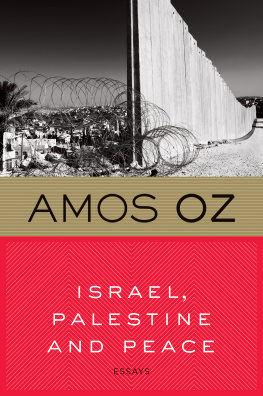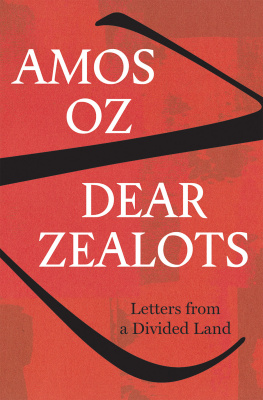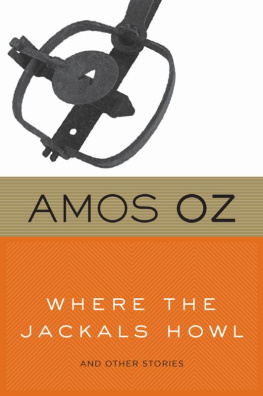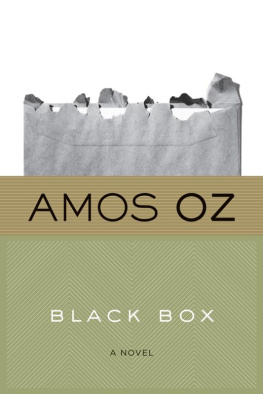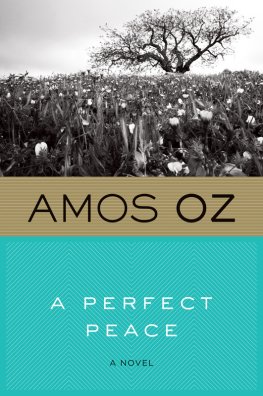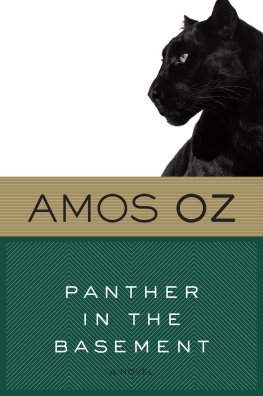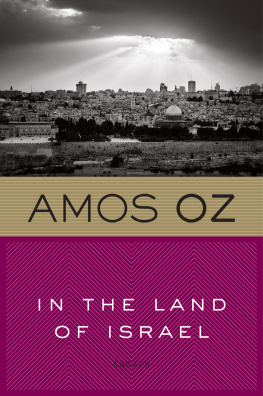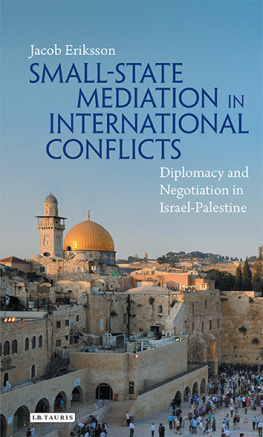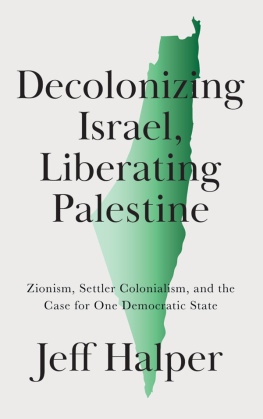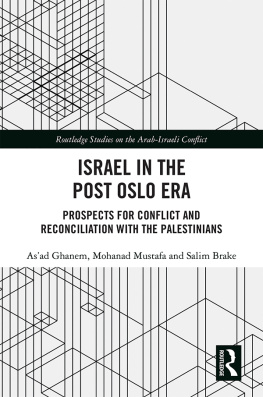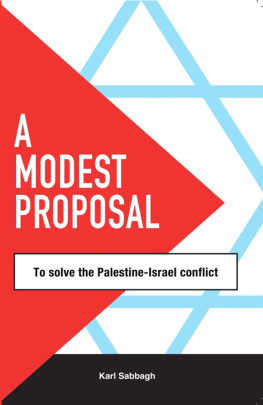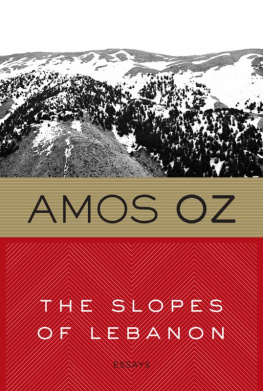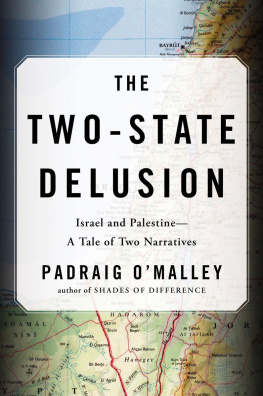Copyright 1994, 1993, 1992, 1982, 1978 by Amos Oz
All rights reserved. No part of this publication may be reproduced or transmitted in any form or by any means, electronic or mechanical, including photocopy, recording, or any information storage and retrieval system, without permission in writing from the publisher.
For information about permission to reproduce selections from this book, write to Permissions, Houghton Mifflin Harcourt Publishing Company, 215 Park Avenue South, New York, New York 10003.
www.hmhco.com
The Library of Congress has cataloged the print edition as follows:
Oz, Amos.
[Essays. English. Selections]
Israel, Palestine, and peace: essays/Amos Oz.
p. cm.
A Harvest original.
Previously published: Whose Holy Land?
New York: Vintage, 1994.
ISBN 978-0-15-600192-2
1. Jewish-Arab relations1973 2. IsraelPolitics
and government. 3. PalestinePolitics and government1948
I. Title.
DS119.7.096 1995
956.9405dc20 95-5777
e ISBN 978-0-547-56404-3
v3.1114
Acknowledgements
Integrity
Speech, Budapest, October 1985. Translated by Amos Ozand Maggie Goldberg-Bartura.
Has Israel Altered its Visions?
New York Times Magazine, 11 July 1982. Translated byMaggie Goldberg-Bartura and Amos Oz.
The Real Cause of my Grandmothers Death
Lecture, Tel Aviv, 1992; Cambridge 1993. Translated byOra Cummings.
From Jerusalem to Cairo: Escaping from the Shadow of the Past
Encounter, 1982. Translated by Nicholas de Lange.
Between Europe and the Negev Desert
Interview, Frankfurter Allgemeine Zeitung, 3 May 1990.Translated by Jenny Chapman.
Peace and Love and Compromise
Acceptance Speech, International Peace Prize of the GermanPublishers Association, Frankfurt, October 1992.
Whose Holy Land? Divided Israel in Palestine
Weekend Guardian, 2324 December 1989. Translated byNicholas de Lange.
Telling Stories under Siege
Speech, Writers Conference, Barcelona 1976. Translated byMaggie Goldberg-Bartura.
The Israeli-Palestinian Conflict: Tragedy, Comedy and Cognitive Block
Lecture, Ann Arbor, 1992.
At the Bridge
Guardian, 1 September 1993. Translated by Ora Cummings.
Hizbollah in a Skullcap
Observer, 27 February 1994. Translated by Ora Cummings.
Clearing the Minefields of the Heart
Speech, Peace Now rally, Tel Aviv, 4 September 1993. Translatedby Ora Cummings.
Preface
T HIS COLLECTION CONTAINS essays, articles, speeches and one interview, written or delivered over a period of several stormy years. Many of them were born out of bewilderment, shame and rage; most of them were not written in cold blood. Re-reading these articles, I have omitted some repetitionsthe usual crime and punishment of a long effort to convey an argument to reluctant audiences. However, some repetitions remain, serving perhaps as a persistent refrain.
Much of this book deals with the Israeli-Palestine conflict. As a storyteller, I find I can live, perhaps more easily than others, with the existence and validity of two mutually exclusive narratives concerning the causes and the consequences of this tragedy. Were it not soaked in death and suffering, I might even have found a certain comical dimension to the mirror image relationship between fanatics and self-righteous preachers on both sides. In my view, however, it is not necessary for Israelis and Palestinians to reconcile the contradictory versions of their past histories in order for them to live peacefully side by side in the future. There is no need to establish whose fault it was, whose blindness it was that caused the tragedy. What we need is to find a way out of the mire.
Israelis and Palestinians may disagree with each other forever over the narrative and significance of their interwoven histories. Nevertheless, they might benefit from injecting a measure of relativism into the usually rigid conceptions of the normality of each others past and present positions.
Since 1967, a number of Israelis have been advocating a two-state solution, based on the partition of the land, roughly according to demographic lines. This idea has, for many years, been a hard one to sell, both to the Israelis and to the Arabs: most Israelis felt that the war we fought in 1967 was a just war of self-defence, that ancestral land acquired in that war ought not to be returned to the Arabs, who would settle for nothing short of the extermination of Israel. The Arabs, for their part, including the Palestinians, were claiminguntil a few years agothat the creation and the very existence of the State of Israel is, in itself, an act of aggression against them, and that therefore Israel ought not only to be kicked out of the territories she conquered in 1967she must be made to go away altogether.
Most people on both sides could make no moral distinction between the right over the West Bank and the right over Galilee.
The idea of a territorial compromise based on mutual recognition was able to gain ground only after both sides found themselves on the receiving end of a few painful slaps of harsh reality: the Arab defeat in 1967, the Israeli near-defeat in 1973, the bilateral Israeli-Egyptian peace-for-land treaty in 1978, the Lebanon fiasco in 1983, the Palestinian intifada uprising since 1987, the Gulf War in 1991, the change of government in Israel in 1992, the Oslo accords in 1993 and, recently, the implementation in Gaza and Jericho of the initial phase of the first agreement ever signed by Israelis and Palestinians. Each one of these events should be viewed as a stepping-stone on the long road to a tormenting, cognitive change on both sides; each of them prompted the realization that merely ignoring the existence or aspirations of the Other, would never make that Other go away.
As I write this preface (in July 1994), nearly half of the Palestinians who lived under Israeli military administration between June 1967 and May 1994, the inhabitants of the Gaza region and of Jericho district, are enjoying a PLO regime. A PLO police force and Israeli troops are conducting joint patrols along the new lines, providing relative calm for both sides. A modest measure of co-ordination and even co-operation is beginning to develop between the former deadly enemies. The Palestinians do not yet enjoy full sovereignty anywhere, nor have they had the chance to elect their own government. But if the present phase of the agreement is carried out with sincerity and wisdom by both sides, Gaza and Jericho first can evolve in a few years into a Palestinian state comprising most of the territories occupied by Israel in 1967.
For a very long time Arabs, Israelis and outside observers mistook this conflict for an ethnic clash between two communities within one society; or for a religious war; or for a struggle for de-colonization; in short, for some kind of civil war. At last, both parties are beginning to see it for what it isan international conflict, a clash between two different nations each claiming the same piece of land for itself. In a word, a dispute over real estate, albeit steeped in historic traumas and wounded feelings on both sides.
A dispute over real estate can be resolved through a compromise which may leave no one happy, but enables everyone to stop killing and being killed. I have maintained since 1967 that wherever right clashes with right, a value higher than right ought to prevailand this value is life itself.
A great deal has yet to be negotiated between the parties: security, boundaries, Jerusalem, settlements, water, economic relations, and comprehensive regional peace accords, to mention only the main issues. But the departure point for the hard work is now accepted by the main parties: we have agreed that the matter of Israel and Palestine is no longer an either-or issue; that the two national aspirations are not condemned to be mutually exclusive.
Next page
